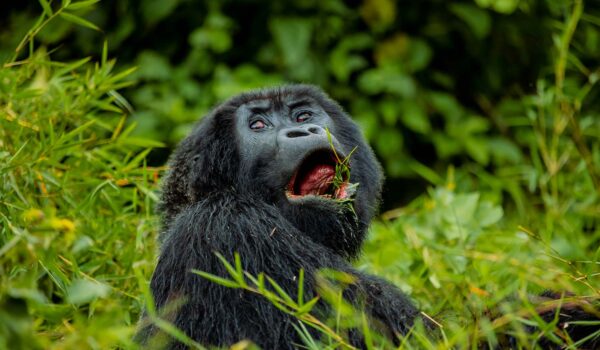Rwanda National Parks
Rwanda is one of Africa’s smallest countries, yet it has an impressive natural richness. Its small size allows for fast and easy travel between points of interest, which is fortunate considering Rwanda’s broad assortment of magnificent spots to explore. Despite its modest size, Rwanda’s breathtaking scenery and kind, friendly people provide one-of-a-kind experiences. With its great gorilla population, mountains, highland rainforests, and broad plains, safari excursions in Rwanda are guaranteed to include numerous rare creatures.
Due to Rwanda’s size, almost all sites of interest are within a 4-hour drive from Kigali. Rwanda safari offers several activities for the visitors including; mountain gorillas, climb to the summits of towering mountains, and unwind by the gorgeous and timeless Lake Kivu. You could discover some Rwanda tourism attractions that will help you better organize your ideal itinerary to this magnificent East African nation.
Rwanda, known as the “Land of a Thousand Hills,” is home to an impressive array of national parks, each unique in its biodiversity, landscape, and the conservation efforts that preserve its natural beauty. These parks not only offer extraordinary opportunities for ecotourism but also reflect Rwanda’s commitment to wildlife protection and environmental sustainability. The four main national parks in Rwanda—Volcanoes National Park, Akagera National Park, Nyungwe Forest National Park, and Gishwati-Mukura National Park—each contribute uniquely to the country’s ecological and cultural richness.
Volcanoes National Park, Gorilla trekking and bird watching experience.
Volcanoes National Park, in northeastern Rwanda, is perhaps the most renowned of Rwanda’s national parks. This park, part of the Virunga Massif that stretches into Uganda and the Democratic Republic of Congo, is well-known across the world as a mountain gorilla refuge. The park covers around 160 square kilometers and has five dormant volcanic mountains, including Mount Karisimbi and Mount Bisoke.
Tourists may engage in gorilla trekking, which is one of the park’s main attractions. This experience enables guests to get up close and personal with one of the world’s most endangered species, giving them the opportunity to witness these gorgeous creatures in their natural environment. Trekking permits and tight rules contribute to the protection of these gorillas, while tourist income funds community development programs in the surrounding region. Volcanoes National Park also provides as a haven for other animal species such as golden monkeys, forest elephants, and a variety of bird species, making it a biodiverse paradise that adds to Rwanda’s status as a top ecotourism destination.
Akagera National Park, Big five game viewing.
Akagera National Park, located in eastern Rwanda near the Tanzanian border, is the country’s sole savannah park. Akagera covers more than 1,200 square kilometers and has a diversified topography that includes undulating savannah plains, woods, lakes, and marshes. Its distinctive topography gives it a great habitat for a diverse range of species, including Africa’s renowned “Big Five”—elephants, lions, leopards, buffalo, and rhinoceros.
Akagera has witnessed tremendous transformations in recent years, mainly to conservation initiatives spearheaded by the Rwandan government in collaboration with African Parks. These efforts have included returning lions and black rhinos, which were formerly regionally extinct, in order to restore the park’s natural balance and biodiversity. The Akagera River and a number of lakes inside the park also host a diverse range of birds, including the uncommon shoebill stork. Akagera provides the traditional African safari experience in Rwanda, with game drives, boat safaris, and bird-watching excursions that immerse guests in the nature.
Nyungwe Forest National Park, Primates: chimp trekking and bird watching.
Nyungwe Forest National Park, situated in southwest Rwanda near Lake Kivu, is one of Africa’s oldest rainforests and a biodiversity hotspot. Nyungwe, which covers more than 1,000 square kilometers, is known for its lush vegetation, breathtaking mountain vistas, and diverse wildlife, which includes over 1,000 plant species, 75 animal species, and 300 bird species.
Nyungwe is well-known for its primate population, which includes 13 distinct species, including the famed chimps and the uncommon Angola colobus monkey. Nyungwe is especially known for its spectacular canopy walk, which provides tourists a unique view of the forest from 50 metres above ground. Hiking routes run throughout the park, enabling visitors to appreciate the beauty of the forest and its rich flora and animals. The park is important for water conservation since it serves as a watershed for the Nile and Congo River basins, making its preservation critical to regional ecosystems.
Gishwati-Mukura National Park, Chimpanzees and Birds
Gishwati-Mukura National Park is Rwanda’s newest national park, created in 2015 to safeguard the Gishwati and Mukura woods, which had been severely deforested and degraded. This park, which spans around 34 square kilometers in western Rwanda, has witnessed considerable reforestation and biodiversity restoration activities.
The park has a small population of chimps, as well as golden, blue, and L’Hoest’s monkeys. Gishwati-Mukura also supports a variety of bird species, some of which are indigenous to the Albertine Rift. The park, which is currently establishing its tourist infrastructure, represents Rwanda’s commitment to conservation and sustainable land use. Community participation has been critical to the park’s reestablishment, ensuring that resident’s profit from projects like as ecotourism and agroforestry, which assist to protect the delicate ecology.
Lake Kivu
Lake Kivu, located on Rwanda’s western border, is a large expanse of water surrounded by beautiful hills and offers good hiking, chimp trekking, bird viewing, and canopy walks. Lake Kivu has also established a standard for the breathtaking beauty you will find in Rwanda’s top tourist sites. You will stay in Gisenyi, a little village on the northern coast from where you may go kayaking or boating. Kivu is a calm area to recover after a long-haul journey or to unwind after a day of gorilla trekking and other great experiences in Rwanda.
Rwanda’s national parks not only provide habitat for a vast range of species, but also demonstrate the country’s dedication to conservation and sustainability. These parks—Volcanoes National Park, Akagera National Park, Nyungwe Forest National Park, and Gishwati-Mukura National Park—provide unique experiences, ranging from hiking with mountain gorillas to exploring huge savannahs and ancient forests. Rwanda’s national parks serve an important role in maintaining the country’s natural heritage while also encouraging ecotourism as a sustainable development route. For tourists, these parks provide not just a glimpse into nature’s beauties, but also an opportunity to interact with Rwanda’s continuous efforts to safeguard the environment and empower communities.

